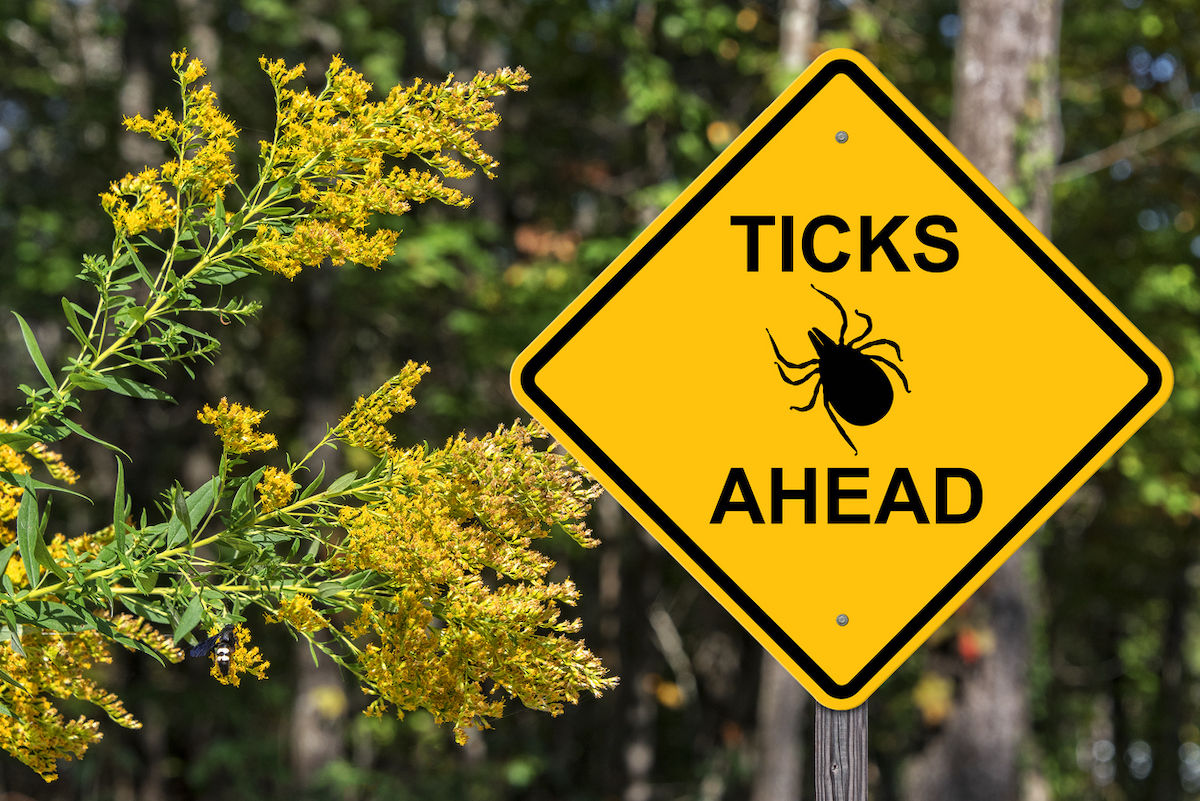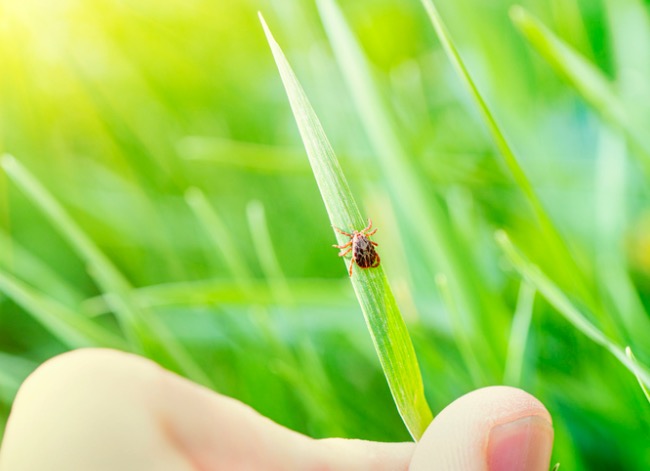

We may earn revenue from the products available on this page and participate in affiliate programs. Learn More ›
Q: After a friend got infected with Lyme disease from a tick bite a few years ago, I’ve been worried about getting tick bites while out in the woods or working in my yard. When is tick season, and what should I do to prepare for it?
Being worried about tick season is understandable, and taking the appropriate measures to protect yourself and your family is important during tick season. Ticks carry a variety of diseases, including Lyme disease, ehrlichiosis, and Rocky Mountain spotted fever. Lyme disease is the most common disease transmitted by ticks and, according to the CDC, approximately 30,000 cases are reported by state health departments every year. It’s important to note that the CDC’s data only includes officially reported cases. Using other methods of measurement such as insurance records indicate that the total number of Americans diagnosed and treated for Lyme disease each year is likely much higher.
Some things you should do to protect yourself from ticks include wearing long pants and long sleeves in areas where ticks are commonly found, using insect repellents, and checking for ticks on your body after being outside. But when is tick season, exactly, and when should you begin taking these precautions?

For much of the United States, early spring is the start of tick season.
When do ticks come out? While some tick species remain active throughout the colder winter months, others go dormant during the winter. As temperatures start to warm up in the early spring, however, tick species that had been dormant begin searching for a blood meal. This kicks off the beginning of tick season. Bear in mind that in warmer climates, early spring occurs sooner than mid-March.
Since early spring is also when people begin spending more time engaging in outdoor activities such as hiking and gardening, it can put them at an even higher risk of running into a tick. Taking precautions to prevent tick bites starting in the early spring is advisable.
RELATED: Keep Ticks at Bay with 9 Smart Landscaping Tips

May through August is considered peak tick season.
You know that time of the year when you find yourself asking, “Why are ticks so bad this year?” If you’re noticing the proliferation of the insects it’s probably peak tick season, which typically lasts from May through August. Tick nymphs—the second stage in the 4-stage tick life cycle—emerge in May. After emerging, the nymphs join the adult ticks that have been feeding since early spring (or even earlier, in some parts of the country). This increase in tick activity means that May is typically the month when ticks are the most abundant.
In fact, warmer temperatures in the summer can actually make ticks more active. Ticks are cold blooded, so their internal temperature varies based on the air temperature. When temperatures are consistently between 70 and 90 degrees Fahrenheit, which they often are in May through August, ticks breed more and look for food even more frequently.
RELATED: Our Favorite Tick Spray Is Safe for Kids and Pets
Tick season usually ends around the time when temperatures start dipping below freezing.
When do ticks go away? As summer ends and the weather cools down in the fall, ticks become less active. In many areas of the country, tick season ends once the temperature starts to drop below freezing. Some tick species die in freezing temperatures, while others may just become dormant until the weather warms up enough to find another blood meal. Other species, such as deer ticks, are better able to tolerate colder weather and can still be active during the winter.
While you might think that a very snowy winter would kill off a large portion of the tick population, the opposite is actually true. Snow can provide insulation for ticks hiding beneath leaves and other debris on the ground, and can help them survive through the winter. The best weather conditions for killing off more ticks are extended periods of below-freezing temperatures with late or minimal snow accumulation.
RELATED: 15 Plants to Grow for a Pest-Proof Yard

For some regions in the United States, tick season lasts all year long.
Historically, areas of the United States with more moderate temperatures don’t see the same annual drop in tick activity that colder regions do. Without temperatures dropping below zero, ticks remain active and continue searching for food.

Even if you live in an area that typically experiences freezing temperatures, years with mild or shortened winters can lead to increased tick activity. The EPA projects that a nationwide uptick in Lyme disease may be the result of warming temperatures and shorter winters, both effects of climate change. In states like Massachusetts and Connecticut, where ticks normally go dormant in winter, experts are observing signs of ticks year round. If this worrying trend continues, a growing number of U.S. residents may need to take precautions against ticks all year long.
Even as tick species’ habitat ranges may spread as annual temperatures warm, consulting up-to-date tick maps can help you identify active species in your area. The more informed you are about which ticks you’re dealing with and where, the better you can prepare and protect yourself.
RELATED: Solved! What to Do When You Find Ticks in the House
A longer tick season means more opportunities for diseases to spread.
The CDC has identified 16 different diseases transmitted by ticks in the United States, including Lyme disease, Colorado tick fever, tick-borne relapsing fever (Borrelia miyamotoi infection), and anaplasmosis. Ticks in the nymph stage are the most likely to carry and transmit these diseases to humans.
Summer is generally the time when pet owners and other people need to be the most wary of ticks when outdoors. However, growing habitat ranges and activity periods could mean the risk of tick bites and tick-borne diseases needs to be taken seriously year round.
How to Prevent Ticks

Avoiding tick-borne diseases starts with knowing how to prevent tick bites in and around your home, and there are plenty of repellents, tick treatments for the yard, and other measures that get the job done. For best results, begin using these methods well ahead of tick season (or, in regions with year-round ticks, peak tick season).
- Mow the lawn regularly, especially grass that is in close proximity to the house
- Rake and remove leaves from the yard to deny ticks shelter
- Keep stacks of firewood as far away from the home as possible
- Avoid growing invasive plants that attract animals commonly affected by ticks, such as Japanese barberry
- Deter potentially tick-infested rodents and deer from entering your lawn
- Check your pets for ticks and immediately remove any you find
- Use veterinarian-recommended flea and tick prevention products on your pets regularly
- Check your clothing, personal items, and skin for ticks when coming indoors

